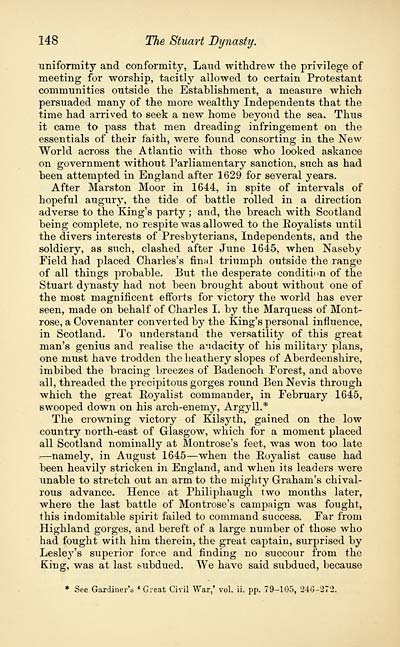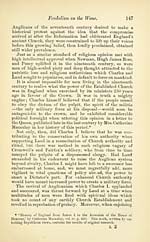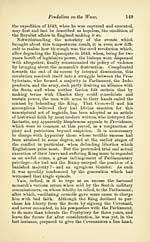Stuart dynasty
(168) Page 148
Download files
Complete book:
Individual page:
Thumbnail gallery: Grid view | List view

148 The Stuart Dijnasty.
uniformity and conformity, Laud withdrew the privilege of
meeting for worship, tacitly allowed to certain Protestant
communities outside the Establishment, a measure which
persuaded many of the more wealthy Independents that the
time had arrived to seek a new home beyond the sea. Thus
it came to pass that men dreading infringement on the
essentials of their faith, were found consorting in the New
World across the Atlantic with those who looked askance
on government without Parliamentary sanction, such as had
been attempted in England after 1629 for several years.
After Marston Moor in 1644, in spite of intervals of
hopeful augury, the tide of battle rolled in a direction
adverse to the King's party ; and, the breach with Scotland
being complete, no respite was allowed to the Eoyalists until
the divers interests of Presbyterians, Independents, and the
soldiery, as such, clashed after June 1645, when Naseby
Field had placed Charles's final triumph outside the range
of all things probable. But the desperate condith m of the
Stuart dynasty had not been brought about without one of
the most magnificent efforts for victory the world has ever
seen, made on behalf of Charles I. by the Marquess of Mont-
rose, a Covenanter converted by the King's personal influence,
in Scotland. To understand the versatility of this great
man's genius and realise the a'idacity of his military plans,
one must have trodden the heathery slopes of Aberdeenshire,
imbibed the bracing breezes of Badenoch Forest, and above
all, threaded the precipitous gorges round Ben Nevis through
which the great Eoyalist commander, in February 1645,
swooped down on his arch-enemy, Argyll.*
The crowning victory of Kilsyth, gained on the low
country north-east of Glasgow, which for a moment placed
all Scotland nominally at Montrose's feet, was won too late
— namely, in August 1645 — when the Royalist cause had
been heavily stricken in England, and when its leaders were
unable to stretch out an arm to the mighty Graham's chival-
rous advance. Hence at Philiphaugh iwo months later,
where the last battle of Montrose's campaign was fought,
this indomitable spirit failed to command success. Far from
Highland gorges, and bereft of a large number of those who
had fought with him therein, the great captain, surprised by
Lesley's superior force and finding no succour from the
King, was at last kubdued. We have said subdued, because
* See Gardiner's « Great Civil War,' vol. ii. pp. 79-105, 246-272.
uniformity and conformity, Laud withdrew the privilege of
meeting for worship, tacitly allowed to certain Protestant
communities outside the Establishment, a measure which
persuaded many of the more wealthy Independents that the
time had arrived to seek a new home beyond the sea. Thus
it came to pass that men dreading infringement on the
essentials of their faith, were found consorting in the New
World across the Atlantic with those who looked askance
on government without Parliamentary sanction, such as had
been attempted in England after 1629 for several years.
After Marston Moor in 1644, in spite of intervals of
hopeful augury, the tide of battle rolled in a direction
adverse to the King's party ; and, the breach with Scotland
being complete, no respite was allowed to the Eoyalists until
the divers interests of Presbyterians, Independents, and the
soldiery, as such, clashed after June 1645, when Naseby
Field had placed Charles's final triumph outside the range
of all things probable. But the desperate condith m of the
Stuart dynasty had not been brought about without one of
the most magnificent efforts for victory the world has ever
seen, made on behalf of Charles I. by the Marquess of Mont-
rose, a Covenanter converted by the King's personal influence,
in Scotland. To understand the versatility of this great
man's genius and realise the a'idacity of his military plans,
one must have trodden the heathery slopes of Aberdeenshire,
imbibed the bracing breezes of Badenoch Forest, and above
all, threaded the precipitous gorges round Ben Nevis through
which the great Eoyalist commander, in February 1645,
swooped down on his arch-enemy, Argyll.*
The crowning victory of Kilsyth, gained on the low
country north-east of Glasgow, which for a moment placed
all Scotland nominally at Montrose's feet, was won too late
— namely, in August 1645 — when the Royalist cause had
been heavily stricken in England, and when its leaders were
unable to stretch out an arm to the mighty Graham's chival-
rous advance. Hence at Philiphaugh iwo months later,
where the last battle of Montrose's campaign was fought,
this indomitable spirit failed to command success. Far from
Highland gorges, and bereft of a large number of those who
had fought with him therein, the great captain, surprised by
Lesley's superior force and finding no succour from the
King, was at last kubdued. We have said subdued, because
* See Gardiner's « Great Civil War,' vol. ii. pp. 79-105, 246-272.
Set display mode to:
![]() Universal Viewer |
Universal Viewer | ![]() Mirador |
Large image | Transcription
Mirador |
Large image | Transcription
Images and transcriptions on this page, including medium image downloads, may be used under the Creative Commons Attribution 4.0 International Licence unless otherwise stated. ![]()
| Histories of Scottish families > Stuart dynasty > (168) Page 148 |
|---|
| Permanent URL | https://digital.nls.uk/94819782 |
|---|
| Description | A selection of almost 400 printed items relating to the history of Scottish families, mostly dating from the 19th and early 20th centuries. Includes memoirs, genealogies and clan histories, with a few produced by emigrant families. The earliest family history goes back to AD 916. |
|---|

